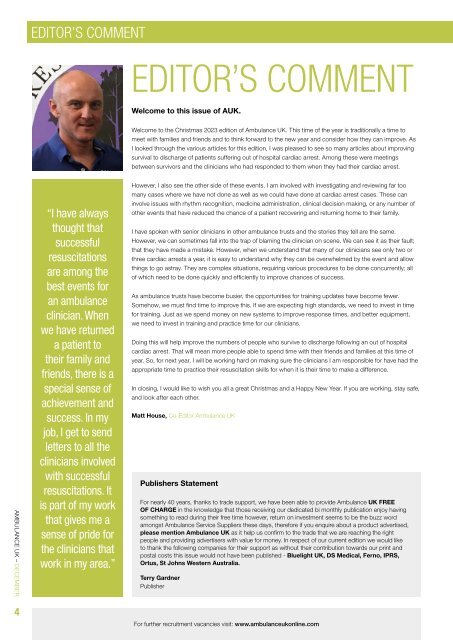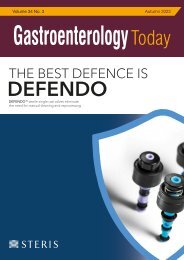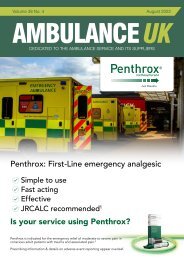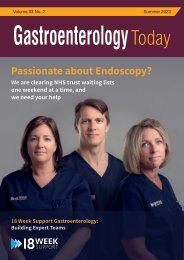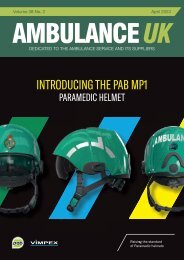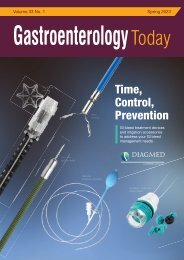Ambulance UK December 2023
Ambulance UK December 2023
Ambulance UK December 2023
You also want an ePaper? Increase the reach of your titles
YUMPU automatically turns print PDFs into web optimized ePapers that Google loves.
EDITOR’S COMMENT<br />
EDITOR’S COMMENT<br />
Welcome to this issue of A<strong>UK</strong>.<br />
Welcome to the Christmas <strong>2023</strong> edition of <strong>Ambulance</strong> <strong>UK</strong>. This time of the year is traditionally a time to<br />
meet with families and friends and to think forward to the new year and consider how they can improve. As<br />
I looked through the various articles for this edition, I was pleased to see so many articles about improving<br />
survival to discharge of patients suffering out of hospital cardiac arrest. Among these were meetings<br />
between survivors and the clinicians who had responded to them when they had their cardiac arrest.<br />
However, I also see the other side of these events. I am involved with investigating and reviewing far too<br />
many cases where we have not done as well as we could have done at cardiac arrest cases. These can<br />
AMBULANCE <strong>UK</strong> – DECEMBER<br />
“I have always<br />
thought that<br />
successful<br />
resuscitations<br />
are among the<br />
best events for<br />
an ambulance<br />
clinician. When<br />
we have returned<br />
a patient to<br />
their family and<br />
friends, there is a<br />
special sense of<br />
achievement and<br />
success. In my<br />
job, I get to send<br />
letters to all the<br />
clinicians involved<br />
with successful<br />
resuscitations. It<br />
is part of my work<br />
that gives me a<br />
sense of pride for<br />
the clinicians that<br />
work in my area.”<br />
involve issues with rhythm recognition, medicine administration, clinical decision making, or any number of<br />
other events that have reduced the chance of a patient recovering and returning home to their family.<br />
I have spoken with senior clinicians in other ambulance trusts and the stories they tell are the same.<br />
However, we can sometimes fall into the trap of blaming the clinician on scene. We can see it as their fault;<br />
that they have made a mistake. However, when we understand that many of our clinicians see only two or<br />
three cardiac arrests a year, it is easy to understand why they can be overwhelmed by the event and allow<br />
things to go astray. They are complex situations, requiring various procedures to be done concurrently; all<br />
of which need to be done quickly and efficiently to improve chances of success.<br />
As ambulance trusts have become busier, the opportunities for training updates have become fewer.<br />
Somehow, we must find time to improve this. If we are expecting high standards, we need to invest in time<br />
for training. Just as we spend money on new systems to improve response times, and better equipment,<br />
we need to invest in training and practice time for our clinicians.<br />
Doing this will help improve the numbers of people who survive to discharge following an out of hospital<br />
cardiac arrest. That will mean more people able to spend time with their friends and families at this time of<br />
year. So, for next year, I will be working hard on making sure the clinicians I am responsible for have had the<br />
appropriate time to practice their resuscitation skills for when it is their time to make a difference.<br />
In closing, I would like to wish you all a great Christmas and a Happy New Year. If you are working, stay safe,<br />
and look after each other.<br />
Matt House, Co-Editor <strong>Ambulance</strong> <strong>UK</strong><br />
Publishers Statement<br />
For nearly 40 years, thanks to trade support, we have been able to provide <strong>Ambulance</strong> <strong>UK</strong> FREE<br />
OF CHARGE in the knowledge that those receiving our dedicated bi monthly publication enjoy having<br />
something to read during their free time however, return on investment seems to be the buzz word<br />
amongst <strong>Ambulance</strong> Service Suppliers these days, therefore if you enquire about a product advertised,<br />
please mention <strong>Ambulance</strong> <strong>UK</strong> as it help us confirm to the trade that we are reaching the right<br />
people and providing advertisers with value for money. In respect of our current edition we would like<br />
to thank the following companies for their support as without their contribution towards our print and<br />
postal costs this issue would not have been published - Bluelight <strong>UK</strong>, DS Medical, Ferno, IPRS,<br />
Ortus, St Johns Western Australia.<br />
Terry Gardner<br />
Publisher<br />
Specialist Patient<br />
Transport Services<br />
Delivering Specialist Patient Transport Services across the <strong>UK</strong><br />
with a strong focus on clinical quality and patient experience.<br />
High Dependency<br />
Transport of critically ill<br />
patients from the Intensive<br />
Care Unit (ICU).<br />
Get in touch:<br />
Our Transfer Services Include<br />
Bariatric<br />
Transfers designed to cater<br />
to the unique needs of<br />
bariatric patients.<br />
Secure Mental Health<br />
Secure Transfers for people<br />
suffering from mental health<br />
issues.<br />
Repatriation<br />
Repatration services both to<br />
and from Europe delivered<br />
by our experienced team.<br />
4<br />
For further recruitment vacancies visit: www.ambulanceukonline.com<br />
0800 254 5261 www.IPRSMTS.com<br />
mtscontrol@iprsgroup.com


